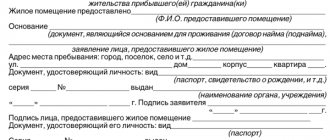Extract from an apartment and private house
2
Citizens of the Russian Federation who have not reached the age of majority are maximally protected by current legislation. Therefore, it is impossible to commit any actions regarded as a violation of their interests and rights. The issue of removing a minor from the owner’s apartment must be considered from the point of view of the law, in compliance with established standards and with the provision of the necessary documents.
Instructions on how to register a minor child at the place of one of the parents?
Legislative aspects and standard package of documents
The rights of the child are protected by the Housing and Civil Codes of the Russian Federation. The state structure - the guardianship and trusteeship authorities - protects his property rights. A real estate transaction will be considered void if it is not approved by the guardianship authorities. In any situation, the authorities are on the side of the minor.
Important! You cannot discharge a child “to nowhere.” He must be given a new place of residence. Moreover, the conditions in another place must be equal or better than in the previous one.
An application for deregistration of a minor is considered by the court. Relevant documents are attached to it.
- Completed application. Its form can be found on the resources of the Federal Migration Service. The required fields to fill out are: full name, registration address, passport information, new registration address.
- Identity document for the applicant (passport) and the minor (birth certificate for children under 14 years of age and passport if his age exceeds 14 years);
- Documents confirming ownership of real estate.
The list of documents may differ in different regions. Detailed information about it can be found on the official website of the Federal Migration Service.
If the applicant cannot independently apply to the Federal Migration Service, then he has the right to transfer his powers to an authorized person who will defend the interests of the interested party in the presence of a notarized power of attorney. The processing time for the application is three working days. If the court grants the application, the applicant will receive a departure certificate. It is used to register at a new place of residence. You shouldn’t delay it: the law provides for fines for violating registration deadlines.
Factors influencing process features
The rules for the discharge procedure depend on specific circumstances:
- Age of the child. For a person under 14 years of age, there are a number of additional restrictions.
- Availability of a share in the apartment.
- Consent of guardianship authorities and legal representatives.
- Characteristics of the housing from which the extract is being made and where registration is expected.
You cannot discharge a citizen under 18 years of age (even a 17-year-old) to “nowhere . The extract must be accompanied by a new registration. If the citizen has become an adult, then such a procedure is possible.
Whether the new owner of an apartment has the right to discharge a minor “to nowhere” and how the child is discharged when selling an apartment and moving, we explain in more detail here.
Conditions for expulsion from an apartment for minors
of removing minor children from an apartment is extremely complex, since as part of the procedure, it is necessary to draw up and attach to the registration application papers confirming compliance with the rights of the child, and to complete a number of mandatory formalities.
Discharge of a teenager or young child can be done:
- When a child is deregistered and registered at a new address, not alone, but together with his parents.
- When there is consent for discharge from the guardianship and trusteeship authority .
- If the parents are divorced and live separately, then deregistration can only be carried out with the consent of both.
- If the child is not permanently in the living space, then discharge is made by court decision.
To deregister at the place of registration, you must have a new address in compliance with all living conditions. According to the law, the new place of residence must meet the requirements and be no worse than the previous living space both in terms of square footage and level of comfort.
Instructions. Method number 1 - write out through registration in a new place
The child does not have to be discharged. It is enough to register him at the new place of residence and he will be automatically discharged from there within 3 days - clause 31 of the Decree of the Government of the Russian Federation of July 17, 1995 N 713. Two applications must be submitted at the passport office at the new address.
Choose your situation. How to register a child: 1) through the passport office, MFC or Ministry of Internal Affairs; 2) through State Services; 3) to a municipal apartment (both methods are described).
Other articles
Are you going to sell your apartment? Follow the link to find a list of documents
When can a child be discharged from an apartment before selling?
Only if the following conditions are strictly observed, the law allows the deregistration of children before the purchase and sale of an apartment:
- A share of the apartment belongs to the child, or the entire living space. You will first need to obtain the consent of the POiP. Conducting a transaction without the consent of the POiP is illegal. Even if the child abandoned his property, it will be necessary to notify about this and obtain the consent of the OiP.
Attention : If the child is only registered in the apartment, but is not its owner, then OO&P is not required for approval.
- A minor cannot be deregistered without simultaneously registering at another address. The law requires that the size of the living space previously at his disposal be observed. For example, before moving, a child had his own room with an area of 10 square meters; in the new apartment he should receive the same or a larger room.
Important : It is prohibited to deregister minors in privatized housing in order to register them in a communal apartment.
- When the father and mother of the child(ren) live at different addresses, the deregistration of the minor will require the written consent of the other parent living separately.
You should know : a minor registered at a given address, but not residing there, can be deregistered only through a judicial procedure.
Art. 20 of the Civil Code of the Russian Federation allows children to be deregistered only if in the future the child will be registered in a new living space with any of the parents or legal representatives (guardians).
The child is the owner of the property being sold
The transaction can only be carried out with the approval of the guardianship authorities. The seller or his representative must obtain permission from a government agency to sell real estate. This must be done before the preliminary purchase and sale agreement is executed.
Important! The child's share in the new housing must be equal. That is, if he was the owner of 12 sq. meters in a three-room apartment, then in new housing its share should not be less than this standard. The total footage of the new facility and the number of residents living in it are not taken into account.
If the sale of real estate is not accompanied by a transaction to purchase a new home, then the share expressed in cash must be transferred to his personal account. If this condition is not met, the transaction may be declared invalid and each party will have to return to the original position: the seller must return the money, and the buyer must return the property.
Legislative regulation
Children's rights to housing, as well as norms and rules regarding their residence, are enshrined in the Constitution of the Russian Federation and the Civil Code.
In accordance with Art. 20 of the Civil Code, a child (until he reaches 14 years of age) must live in a residential area together with his parents (or one of them) or guardians. This means that it can only be registered at the registered address of its representative according to the law.
The mother and father of a minor citizen may be registered at different addresses. In this case, the child can be registered with any of them.
Important ! When registering a child for registration, the consent of other citizens registered in this living space is not required (Article 70 of the Housing Code).
List of documents
Anyone can obtain information about what documents are needed to remove a minor from the apartment If the child is the owner of the apartment, then the following documents will be required:
- Application for deregistration . If the child is under 14 years old , then the form is filled out by his representative, whose authority is confirmed by the appropriate document.
- Identity cards of the child’s representatives whose rights are legally confirmed.
- Child's personal document (passport or birth certificate).
- Consent of the guardianship and trusteeship service.
- Title (certificate of ownership) and technical documentation for living space.
- House book, where a note is made about the discharge (for privatized apartments).
- Retirement sheet.
If the child is not the owner of the property, the following documentation will be needed:
- Applicant's passport.
- Birth certificate or passport of the teenager.
- A standard application for deregistration from both parents (or representatives) and from the teenager himself.
- Social rent act or housing order.
- Papers for a new apartment (where the child will be moved). If the apartment is municipal, then the rental agreement , and if the housing has been privatized, then the title documents.
- Technical documentation for both apartments.
- Information about registered persons (certificate is obtained at the passport office).
Where is the discharge carried out and what is the time frame?
Registration of registration of citizens, including minors, is carried out by the following organizations: departments of the Federal Migration Service, passport offices at HOAs, housing departments, MFC .
Upon reaching 14 years of age, a citizen submits an application and draws up a departure form at the Federal Migration Service or MFC independently.
Each procedure included in the general actions to remove a child from registration has its own deadlines established by law .
Guardianship authorities review submitted documents from 14 to 20 days , the Federal Migration Service - 7 days .
After deregistration, you must register the child within three days, providing information to the guardianship authorities.
How to remove a minor child from an apartment after a divorce
Divorce of parents is not grounds for termination of the right to use residential premises by their children. Let's look at cases that are common in practice.
Option No. 1 – the father is against the eviction of children from his living space
As statistics show, after a divorce, most children remain to live with their mother. If they are registered with their father and live with their mother, then questions about how to expel a minor child from the apartment without the father’s consent will not arise. The court will approve the application for deregistration. The other party will not be able to challenge it.
Option No. 2 – mother is against evicting children from father’s living space
In this case, the law will be on the side of the father if the children actually live with the mother. He files a lawsuit to evict the minors. When considering it, the court takes into account the conditions at the previous and new place of residence.
Extract from grandma's apartment
Each parent has the right to register their child in the occupied living space, even if the owner does not consent. When divorcing or moving to a new place, most owners wonder how to remove a minor child from the apartment of a grandparent or other relative.
Here it is important to understand the circumstances on the basis of which the children were registered and the age of the minors. Since the place of residence of children is the place of residence of their parents or one of them, deregistration of minors is possible only upon their written application.
Important! If parents are deregistered, their children automatically lose the right to use the apartment. His new place of residence is determined by the new place of registration of his parents (or one of them).
If a child is the owner of a share of housing, then he can be discharged only with the permission of the guardianship authorities. It can be received by parents, guardians or authorized representatives (if they have a notarized power of attorney).
The owner of the apartment himself, grandparents or other relatives, can evict a minor only through the court. To do this, they need to collect evidence that he does not live in their living space. The court will take into account the technical characteristics of the new housing. This discharge process can take several months.
Is it possible to discharge a minor child without the consent of one of the parents?
It is impossible to answer this question unequivocally, since there are many features and pitfalls. Very often, the mother and father are registered in different places, and the child is registered at birth with one of them.
For example, if a child lives in an apartment that is privatized in the name of his grandfather or grandmother, he can be discharged, although it is very difficult. If the father or mother of the child has the right to use this apartment, the minor cannot be discharged.
After the spouses divorce, the child retains the right to live at the place of registration of one of the parents, since he is a member of the family.
For example, a minor is registered with his father, but actually lives with his mother, and therefore the father cannot sell the apartment or is forced to pay extra utility bills.
Then the father may demand that the child be discharged from his apartment without the mother’s consent and registered at the mother’s place of residence, however, for this he must go to court.
The mother can discharge the child without the consent of the father if she is going to be discharged with him and the conditions of the future housing are not inferior to the previous one . However, to avoid problems with the law, you should first obtain permission to deregister from the guardianship authorities.











